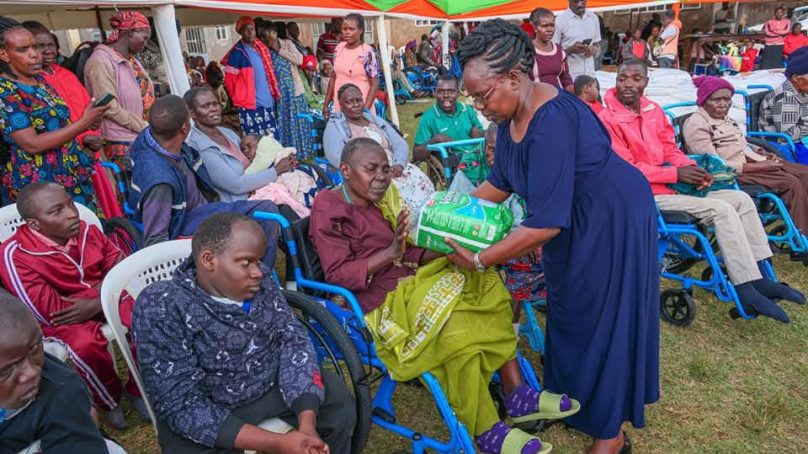
Nandi Deputy Governor Yulita Mitei has emerged as one of Kenya’s most passionate advocates for people living with disabilities (PWDs), giving them a voice and restoring their dignity.
Now in her second term, Dr Mitei is not only making history as the first woman to hold the office of deputy governor in the North Rift, but also as a leader driven by compassion, service and the belief that “disability is not inability.”
Before her political journey began, Mitei made her mark in academia. Being a doctorate holder in chemistry, she previously taught at the University of Eldoret and served as chair of the Disability Mainstreaming Committee in the faculty of natural sciences, an early sign of her commitment to inclusive development.
It was during this period that she gained a deeper understanding of the challenges faced by persons with disabilities, both in the education system and in everyday life. That experience planted the seed for what would later become her life’s mission, to advocate for and empower the most vulnerable in society.
Since assuming office in 2017, Mitei has rolled out transformative programmes that redefine how disability is addressed by county governance.
Her work has gone far beyond symbolic support. She has built structures, developed policies and led grassroots campaigns to ensure real and lasting change. One of her signature achievements is the establishment of the Nandi County Disability Empowerment Centre in Emgwen Sub-County.
This state-of-the-art facility provides practical skills-training in tailoring, baking, shoemaking, hairdressing and ICT. The goal is simple: to equip persons with disabilities with marketable skills to become economically independent.
The centre also serves as a support space for caregivers, many of whom have previously lacked the knowledge, emotional support, and tools needed to care for their loved ones effectively.
“Empowering persons with disabilities go beyond giving them help. It’s about giving them the power to help themselves,” she said during the launch of the centre.
Under her leadership, the county has distributed more than 2,300 assistive devices including wheelchairs, white canes, crutches, surgical shoes, hearing aids and prosthetics.
These distributions, conducted regularly through outreach programmes and public events, have restored dignity and mobility to countless residents. Through the county department of social services, over 340 individuals living with disabilities have received start-up kits and tools of trade such as sewing machines, salon equipment, baking tools, welding machines and kiosks.
These tools have helped beneficiaries launch income-generating ventures and integrate meaningfully into their communities.
Dr Mitei has also led massive medical outreaches in observance of World Clubfoot Day, Albinism Awareness Day and the International Day of Persons with Disabilities.
At these events, hundreds receive free consultations, therapy referrals, surgical assistance and nutritional support especially children and the elderly. Beyond direct interventions, Mitei has worked to embed inclusion in governance.
She played a pivotal role in establishing Nandi County’s Data Desk, a platform that digitises and publishes county budget and development data. This move earned Nandi the 2023 Open Government Award for embracing digital technologies and participatory governance.
The deputy governor also championed the ward development fund, which allows communities at the grassroots to identify and fund priority projects including those serving people living with disabilities. This model has decentralised service delivery and ensured that disability inclusion is not limited to urban centres.
“Inclusion means being seen in the budget, reflected in development plans, and consulted in decisions,” she remarked during a public budget forum.
What makes Mitei most beloved among the people is not just her programmes, but her presence. She is known for showing up unannounced in remote homes to deliver food and supplies, to walk alongside wheelchair users during public parades and to kneel beside elderly caregivers to listen and counsel.
To the children with cerebral palsy, the albino youth facing stigma and the mothers struggling to raise children with disabilities, Mitei is not just a county official, she is a source of hope.
“She listened to me when no one else did,” said Jane Kiprono a single mother of two children with autism who received therapy and a sewing machine through the county’s programme.
As she continues her second term, Mitei’s vision is focused on expanding training centres to all six sub-counties, creating a disability inclusion policy framework and increasing budget allocations toward accessible infrastructure.
She also hopes to see more PWDs included in county employment and leadership, ensuring representation goes beyond support to actual participation.
“Our dream is a Nandi where every person, regardless of ability, has a seat at the table. Not out of sympathy, but because they deserve it,” she said during a recent development summit in the county
Mitei’s work is a powerful reminder that leadership is not about power, it’s about purpose. Her legacy in Nandi County will not only be measured in statistics or infrastructure, but in the lives changed, voices heard, and dignity restored.
In a world where the most vulnerable are often forgotten, Mitei chose to walk alongside them and in doing so, she lit a path for others. According to records, Nandi County is estimated to have 20,000 PWDs with relevant stakeholders calling upon those who have not registered to do so for easy planning.
- A Tell Media / KNA report / By Linet Wafula
Nandi Deputy Governor Yulita Mitei distributes pampers to elderly PWDs at St Peters Catholic church in Kapsabet Town.







